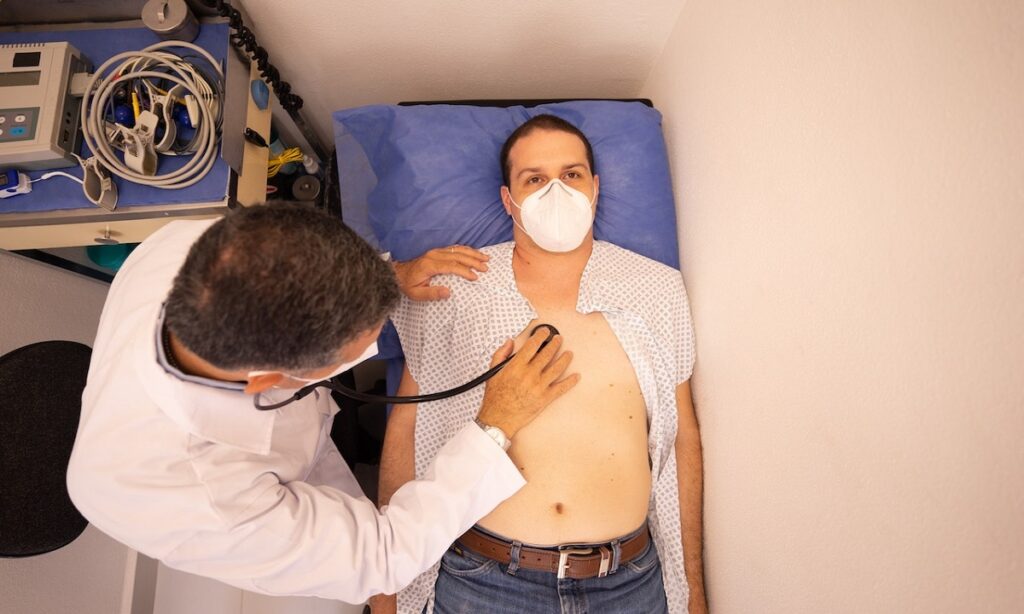Led by Pr Philippe Charron (University Professor – Hospital Practitioner) at the Pitié-Salpêtrière Hospital, the CardI-HACK project aims to combine detailed genetic and clinical data and apply artificial intelligence (AI) to move towards precision medicine by identifying new bioclinical scores capable of better predicting the prognosis of hypertrophic cardiomyopathy (CHM), a rare hereditary disease.
The project has received France 2030 funding for “Data challenges in healthcare” from Bpifrance, and support from the Bouygues Group.

Hypertrophic cardiomyopathy (HCM)

- Hypertrophic cardiomyopathy (HC M) is an inherited heart disease that is a major cause of sudden death and/or heart failure in young people (< 40 years of age).
- Despite improvements in knowledge and management of hypertrophic cardiomyopathy, the disease remains unexplained in more than 1 in 3 cases.
- This relatively rare disease affects 1 in 500 people in the general population.
- It is defined by an increase in the thickness of the wall of the left ventricle of the heart that cannot be explained by loading conditions.
- Until now considered to be monogenic, researchers and doctors have long thought that this disease was linked to a mutation affecting a single gene in the patient.
The disease is characterised by a 20% risk of death at 20 years, and major progress has been made in preventing complications. For example, when a patient is deemed to be at high risk of sudden death from ventricular rhythm disorders (around 20% of patients), an automatic defibrillator is implanted as a preventive measure.
However, clinicians lack effective tools for offering these interventions at the most opportune time for patients.
Current difficulties in establishing personalised follow-up for patients
Due to its rarity, the various clinical and genetic data collected for this disease are heterogeneous and often based on separate cohorts of patients.
At present, cardiogeneticists at rare disease centres are still too often at a loss when faced with the results of genetic and cardiological tests prescribed to assess the disease. In reality, the course of the disease is highly variable and remains difficult to predict.

This is particularly true of their patients’ relatives, who, despite having a similar genetic mutation, sometimes have a completely different clinical picture and/or course.
In fact, they currently use a sudden death risk calculation proposed by the European Society of Cardiology (ESC) in 2014. The relevance of these risk scores is modest and the distinction between high-risk and low-risk patients is insufficient and remains controversial.
The aim of the CardI-HACK research project
Using data from more than 500 patients suffering from hypertrophic cardiomyopathies (HCM), the overall aim of this project is to combine detailed genetic and clinical data and apply Artificial Intelligence (AI) to move towards precision medicine by identifying new bioclinical scores capable of better predicting the prognosis of these pathologies.
The aim is to establish, as accurately as possible and for each patient, a polygenic risk score (PRS), i.e. a combination of high-risk genetic variants, and to integrate it with cardiological data in order to better identify patients who will benefit from pro-active therapeutic management, in particular via the implantation of a medical device (endocavitary or subcutaneous automatic defibrillator, for example).
Artificial Intelligence (AI) will provide a new risk stratification with a direct translational application aimed at guiding therapeutic decision-making. Indeed, we hope that it will enable clinicians to know the risk to which their patients are exposed in order to adapt their decision-making and the frequency of their follow-up.
Project progress
The CardI-HACK project is being managed by Prof. Philippe Charron, Head of the Reference Centre for Hereditary or Rare Cardiac Diseases, with the support of Aurélie Foucher, Project Manager in the ICAN IHU’s Innovation and Research Development team.
The anonymisation of genomic data is a key issue for the CardI-HACK project. Combining the analysis of specialists in artificial intelligence methods from the Sorbonne Center for Artificial Intelligence (SCAI) with the regulatory expertise of the ICAN IHU and its data protection delegate, with the help of the Health Data Hub‘s regulatory and legal teams, a methodology for anonymising genomic data will be defined to meet the regulatory requirements of the RGPD and the scientific requirements of the CardI-HACK project, and submitted to the CNIL for approval.
This project has received funding from Bpifrance as part of the “Data Challenges in Healthcare” call for projects under the France 2030 plan.

The Bouygues Group, sponsor of the CardI-HACK project
Since 2023, the Bouygues Group has been a sponsor of the IHU ICAN, supporting research into cardiometabolic diseases, which cause heart and blood vessel disease.
In 2025, the Bouygues Group has renewed its confidence in the ICAN IHU by supporting the CardI-HACK project, which aims to revolutionise predictive medicine for hereditary heart disease using AI. Our teams warmly thank this patron for his invaluable support!







